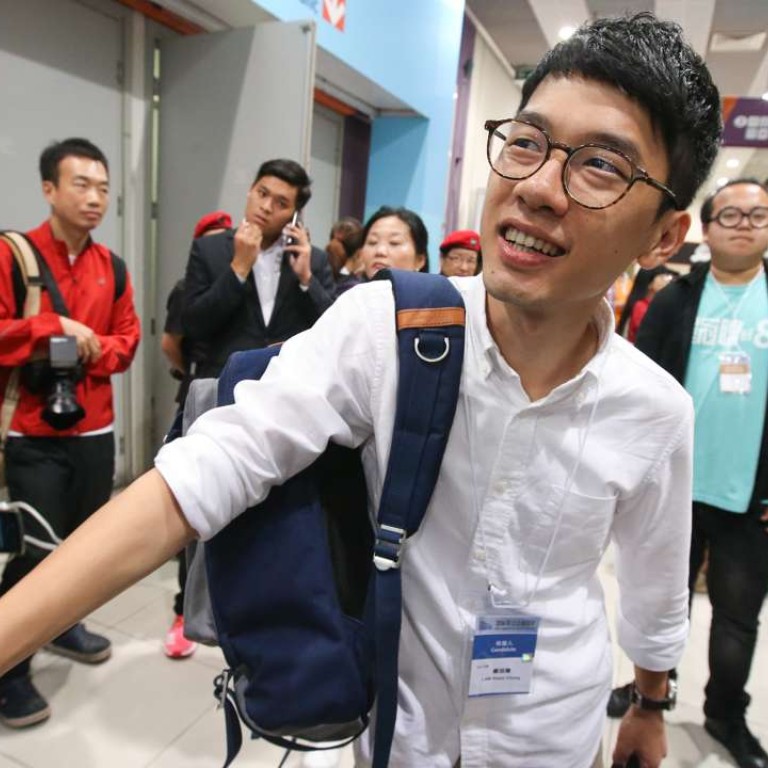
Poll marks start of a new era in Hong Kong’s political life
Record turnout and the rise of young activists shows the strength of democratic aspirations and desire for change: let’s hope it bodes well for the city’s future
The Sunday ballot marks a new chapter in Hong Kong’s history. The record high turnout is the strongest indicator yet of people’s democratic aspirations and desire for change. It also swept a new generation of aspiring young activists into the legislature, raising more uncertainties over governance as well as the city’s future.
There has been a resurgence of interest as a result of the Occupy movement in 2014, the rejection last June by democracy-supporting lawmakers of Beijing’s electoral package for the chief executive poll and growing anti-mainland sentiment that has resulted in the emergence of groups variously labelled as pro-independence, localist and indigenous. Filibustering of Legco business by lawmakers from the democracy camp spurred those supporting the establishment to cast ballots. A younger generation of candidates brought about by new causes and the retirement of long-time legislators also encouraged voters.
It is too early to determine the demographics of those who voted; whether more younger electors than usual cast ballots will be known only after thorough analysis of the polling data. Anecdotal evidence is that it was not only new voters who turned to the fresh faces elected. What is certain, though, is that the body charged with managing the elections, the Electoral Affairs Commission, was unprepared for so high a turnout. It has had to field numerous complaints by electors forced to queue for hours to vote, in one case, at Tai Koo, causing the polling station to close at 2.30am, four hours after it was scheduled to. The vote count only finished after 6pm yesterday.
The rise of young talent
Commission Chairman Mr Justice Barnabas Fung Wah apologised for the “unsatisfactory” polling arrangements. More than a thousand grievances about voting irregularities were received, ranging from problems with voter records to electoral advertising to inability to obtain ballots for the super seats. Queries were also raised after hundreds of extra ballots were found in a polling station in Tai Po. Free and fair elections are essential to ensure voter confidence and each case has to be investigated.
The landslide victory of some localists speaks volumes for the changing sentiment. They have replaced some old faces in the pan-democratic camp. The shift goes beyond a new preference for young political talent. It represents endorsement of confrontational tactics adopted by activists in certain sectors – a trend that gives the wider community cause for concern.
The establishment camp remains strong in the geographical polls, in particular in Kowloon East and New Territories West. The traditional trade-based functional constituencies are still dominated by government-friendly lawmakers. But the pan-democrats managed to keep their base in the welfare, legal and education sectors. The medical and the architectural and surveying seats also went to non-establishment members.
How the young winners vote in the new Legco remains to be seen. Fragmented as it seems, an assertive non-establishment bloc can be formed if they side with the traditional pan-democrats. Although the camp is not strong enough to tilt the current balance of power in the legislature, it still maintains the critical opposition threshold. That said, it does not bode well for effective governance in the next four years. Filibuster is likely to continue following the return of some rebel lawmakers. Along with the localists, there may well be more antics ahead.
The future for governance
Constitutionally, the legislature provides checks and balances to the executive. But it cannot turn into an obstacle for governance and development. The young winners should be reminded that there is a clear distinction between street protests and parliamentary politics. Adapting and adjusting will be expected when they become part of the establishment. More importantly, most people are tired of filibustering and other unconstructive theatrics. It is imperative for the new Legco and the government to maintain better working relations.
The implications for Beijing-Hong Kong relations are also far reaching. The rise of localism over the past few years has given much room for soul searching. Collectively, the vote shares of these localist winners add up to more than 10 per cent. Given their push for self-determination over the city’s long-term future, the post-2047 issue is set to become a public agenda. It would not be surprising if the prevailing tensions between Beijing and Hong Kong intensify further.
Weighing heavily on the new Legco are the aspirations of more than two million voters. It is to be hoped that the city can better develop under a partnership between the new Legco, the Hong Kong government and Beijing.

